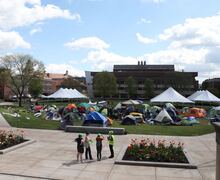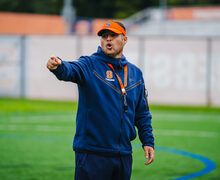A new chapter: Story Project for first-generation students grows
UPDATED: FEB. 28 3:37 a.m.
In a Feb. 23 article titled ‘A new chapter: Story Project for first-generation students grows,’ Amanda Lashua and Christina Jones relationship was misstated. Lashua and Jones do not know each other.
Also in the article, Lashua’s involvement in the project was misconveyed. Lashua submitted her story to the project, but is not a group member.
Also in the article, Tarshus’ discovery that she was a first-generation college student is misstated. No records were involved, and Tarshus only stated that she did not know there was a word for students who are the first in their family to go to college. The Daily Orange regrets these errors.
When Amanda Lashua told her mother she planned to attend college, the only thing she heard was laughter.
‘She thought I was joking,’ said Lashua, who went to high school in New Hampshire. ‘She didn’t actually think I was going to do it.’
To her mother, seeking a postsecondary education was ridiculous. After all, neither she nor Lashua’s father went to college. So at age 16, Lashua began the long journey of being not only the first in her family to complete college but also the first to do so on her own dime.
Lashua, now a teaching assistant and a graduate student in the College of Arts and Sciences working toward her chemistry doctorate, decided to share her journey with the Syracuse University Story Project, a mentorship initiative created for students who are the first in their family to attend college.
After starting last year for graduate and undergraduate students, the Story Project is now opening its doors to faculty and staff who were once first-generation college students to share their stories and give current first-generation students advice. Individuals who are the first in their families to attend college are invited to submit their stories to be posted on the project’s website within the Office of First-Year and Transfer Programs website.
For the Story Project creator, Sudeshna Majumdar, the role of a first-generation mentor is crucial — especially because 18 percent of the students in the Class of 2014 are first-generation students, she said.
Students with a collegiate family can look to their parents for guidance, but first- generation students are without such tools, said Majumdar, a graduate student in the School of Education.
A first-generation student herself, Majumdar began the program by gathering first-generation students in a focus group practicum for the Office of Multicultural Affairs. The goal of the study was to see what made first-generation students successful.
Yet once the initial study was over, the students sought further interaction, having bonded over their unique background and common experiences.
‘They realized that they need this space where they can meet people like them,’ Majumdar said.
Lashua, the graduate student in the College of Arts and Sciences, did not have a space like this when she went to college.
At age 17, she obtained a GED and went to college because she dropped out a year early from high school. As she packed her bags for her undergraduate studies, her mother, after realizing Lashua was in fact leaving for school, threw her belongings out of their second-story balcony. She screamed at Lashua and told her never to come back.
Lashua was alone, and her only support came from federal financial aid checks she applied for herself.
Pulling 60-hour workweeks, she took as many jobs as possible to pay for her remaining tuition bill. She even worked nights as an exotic dancer. This didn’t leave much time for friends, let alone any who could relate to her experiences.
‘I can’t tell you how many mornings I woke up thinking, ‘I’m not going to make it,”
Lashua said. ‘And you have no support because nobody understands. You just feel very alone.’
But using their shared experiences, such as working full time while pursuing a degree as guidance, the Story Project mentors look to support and meet with first-generation students on a regular basis. Whether they just chat while drinking a cup of coffee or fill out a scholarship application together, mentors ensure the students are not only thriving in the college environment but also have someone who understands their unique perspective, Majumdar said.
‘It’s a common experience,’ Majumdar said. ‘But I hope, in the commonality, they find connection.’
Michelle Tarshus, a sophomore information management and technology major, has found that connection since joining the Story Project.
Before Tarshus joined the group, she said she felt disconnected from the rest of her peers in high school because she was half-Caucasian and half-Filipino. That feeling carried over when Tarshus enrolled at SU, and she almost dropped out of school, thinking the experience was not for her, she said.
Tarshus was not aware she was a first-generation college student until Majumdar reached out to her after seeing Tarshus’ parents’ level of education on her records. With the Story Project, Tarshus is able to connect with other students and form the personal relationships she never had.
By relating through their challenges as first-generation students, Tarshus and other students in the project reached out into the community, educating local high school students about the college application process and the importance of an education beyond high school.
‘I started feeling more and more welcome. I felt that family connection,’ Tarshus said. ‘After that, once I started engaging more, I got more involved.’
Now that the Story Project is expanding its scope to both faculty and staff, students have the opportunity to hear from a wider variety of sources, such as Lashua. When she first submitted her story, she thought it would be rejected, assuming her history would be too depressing for a group interested in inspirational education.
But as she spoke with other first-generation students about her financial situation, the hurdles of applying for college and past relationships at home, Lashua met her best friend — Christina Jones, a sophomore broadcast journalism major.
As Lashua became more involved with the group, she realized the importance of mentors for first-generation students. She said her own experience might not have been hard had there been someone to console and inspire her.
Now that she has the opportunity to help similar students, Lashua won’t put it to waste.
Said Lashua: ‘The final line I put in the essay was: ‘When life goes to kick you in the a**, turn around and punch it in the face.”
Published on February 22, 2011 at 12:00 pm




